|
De Noorse schrijver, muzikant en theatermaker Ingvar Ambjørnsen werd
geboren in Tønsberg op 20 mei 1956. Zie ook alle tags voor
Ingvar Ambjørnsen op dit blog.
Uit: Potes pour la vie (Vertaald door Jean-Baptiste Coursaud)
Quand jétais minot, jadorais les
groseilles. Maintenant, jpeux plus les blairer.
Kjell Bjarne a prononcé cette phrase sur un ton
censé me faire comprendre quentre-temps il sétait passé des choses. À savoir
quil avait vécu la moitié dune vie humaine. Et que, sur le chemin de cette
vie, il navait plus goût aux groseilles.
Pour ma part, je nai absolument rien à
reprocher aux baies rouges et acidulées. Les groseilles sont tout à fait à mon
goût. Si le temps mavait confisqué quoi que ce fût, cétait ma capacité à
mégayer. Je ne trouvais plus la vie très folichonne, du moins pas autant que
lorsque jétais enfant. Ce que je me gardais bien de révéler. Pareille
déclaration naurait que perturbé Kjell Bjarne. Et cest dailleurs un
phénomène étrange : si on en vient à dire telle ou telle chose à voix haute,
elle gagne doublement en vérité. Et perd, dans ce cas de figure, tout aussi
doublement sa part de gaieté.
Dautant que je navais grosso modo pas à me
plaindre. Vraiment pas. Je serais même plus proche de la réalité en
avouant que je suis un jeune homme gâté. À linstar de tant de jeunes hommes de
ce pays. Inutile daller courir lAfrique en quête de Noirs pour trouver des
camarades dans de sales draps, il suffisait dobserver ne fût-ce quune seconde
les Noirs vivant à Oslo pour se rendre compte illico que ce pays était tombé
bien bas. Car ils étaient traités, si je ne me fourrais pas le doigt dans
loeil, comme de vulgaires négros. Même par la police. Ou plutôt : tout
particulièrement par la police. « Amène-toi, Bamboula, leur lançaient les
forces de lordre. Voyons voir à quoi il ressemble, ton
faux passeport. » Toujours est-il quon pouvait
lire jusquà lécoeurement des faits similaires dans les colonnes de la presse
nationale.
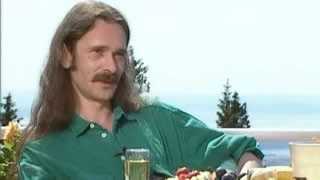
Ingvar
Ambjørnsen (Tønsberg, 20 mei 1956)
In de jaren
1980
De Surinaamse schrijver A.C. Cirino werd geboren in Goede Hoop, een dorp aan de
Coppenamerivier in het district Saramacca, op 20 mei 1929. Zie ook alle tags voor A.C. Cirino
op dit blog.
Uit: Het meisje
en de vogels
O, wat waren de
vogeltjes verdrietig. Bij honderden kwamen ze aangevlogen om haar te troosten
en beterschap te wensen. Overal zaten ze op de grond, op de spanten van het
kamp, op het dak, aan de rand van haar hangmat, zelfs tegen de bladerwand van
het kamp. Overal. En ze piepten en floten al maar door. En ze hadden heel wat
lekkernijen voor haar meegebracht, heel wat bosvruchten. Het hele vogelrijk was
in de waar en in de weer gekomen.
Sommige vogeltjes stierven van verdriet, omdat zij weigerden te eten toen zij
Matuwi maar zagen wegkwijnen. De vogels kwamen bij elkaar en zeiden:
"Matuwi is onze koningin. Hoe kunnen wij haar helpen?" Rediborsu
dacht bij zichzelf: "Matuwi wordt niet beter." En hij bracht zijn
familie om de vogelkoningin te groeten en een goede reis naar het hiernamaals
te wensen.
Een der kleine grijze vogels sprong op Matuwi's armen en pikte haar. Er kwam
wat bloed uit dat op de vogeltjes viel.
Enkele dagen daarna was het dorp en het hele vogelrijk in rouw gedompeld.
Matuwi was overleden. Bij haar begrafenis zaten duizenden vogeltjes stil op de
takken van de bomen toe te kijken. De vogels hadden zo'n verdriet dat zij nooit
meer grote vriendschap met de mensen hebben gesloten. Vanaf die tijd vliegen
zij snel weg als je in hun buurt komt.
En jij die dit verhaal hebt gehoord, weet nu ook waarom de rediborsu rode veren
en een roodachtige bek heeft.
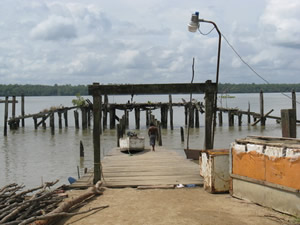
A.C. Cirino (20 mei 1929 - 6 mei
2003)
Uitzicht op de Coppenamerivier, Suriname (Geen portret
beschikbaar)
De Poolse schrijfster en journaliste Hanna Krall
werd geboren op 20 mei 1937 in Warschau. Zie ook alle tags voor Hanna Krall
op dit blog.
Uit: Da ist kein Fluß mehr (Vertaald
door Roswitha Matwin-Buschmann)
Modernity and tradition hatte dabei herauskommen
sollen, aber Radom verstand nichts von modernity. Radom verzichtete auf die
Dienste des Rabbiners, und die Familie zog nach Warschau. Sie trieben jetzt
Handel - en gros und en détail: Mehl, Reis, Grütze, Heringe. »Dynamische
Heringseinfuhr von skandinavischen Märkten«, schrieben die Zeitungen über die
Firma der »Gebrüder Zonenszajn«. Also sprach Dawid, der vom Mehl, Vater von
sechs Kindern: »Meir, wann wirst du erwachsen?« Icie, von der Grütze, Vater von
vier Kindern, sagte: »Meir, wann wirst du ...« Und Szlomo, der vom Reis, Vater
von zwei Kindern: »Meir ...« Aron, Vater einer einzigen Tochter, der jüngsten
in der Familie, der künftigen Philosophieprofessorin, Aron von den Heringen und
den Fischkonserven sprach: »Meir!« Ernsthaft und erwachsen waren sie, die
Brüder, aber wenn Aron, klein und etwas fade, den Salon betrat, war noch keinem
froher ums Herz. Keiner wußte - ist Aron schon, oder ist er noch nicht da. Wenn
Meir eintrat, hellten sich die Gesichter auf, und gleich wurde es freundlicher
in der Welt. 3 Onkel Meir heiratete eine vermögende, mollige Schneiderin mit
langem hellen Haar und kurzem Hals. Sie nahmen sich eine Hausgehilfin. »Ein
Mädchen«, sagte man damals. Sie kam vom Dorf. Hatte wache Augen, ein
zutrauliches Lächeln und eine dicke, leicht vorstehende Oberlippe. Alicja, das
Mädchen vom Dorf, verliebte sich in Onkel Meir. Großer Gott. Alle waren sie in
ihn verliebt, aber doch nicht wirklich. Kein Mensch nahm Onkel Meir ernst. Kein
Mensch - außer diesem Mädchen vom Dorf. 4 Im Krieg erwies sich Alicja als
beherzt und umsichtig. Sie besorgte falsche Papiere. Bestach die Wachen ... Durch
Alicja kamen sie aus dem Ghetto - Onkel Meir, Aron, sein Bruder und ihre
Familien. Meir verließ es als letzter. Er hatte Angst. Zögerte bis zum Schluß,
doch er verließ es mit Façon. Er zog Breeches an, Stiefel, eine Jacke aus einer
grellkarierten Decke - und sofort zerrte ihn ein Schmalzownik in den nächsten
Torbogen.
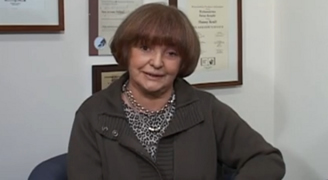
Hanna Krall (Warschau, 20 mei 1937)
De Franse schrijver Hector-Henri Malot werd
geboren in La Bouille bij Rouen op 20 mei 1830. Zie ook alle tags voor Hector
Malot op dit blog.
Uit: Sans famille
Il nous fallait un licou pour conduire notre
vache ; jabandonnai les trente sous, calculant quil nous en resterait
encore vingt.
« Où donc est votre longe ? demanda
le paysan ; je vous ai vendu le licou, je ne vous ai pas vendu la
longe. »
La longe nous coûta vingt sous, nos vingt
derniers sous.
Et lorsquils furent payés, la vache nous fut
enfin livrée avec son licou et sa longe.
Nous avions une vache, mais nous navions plus
un sou, pas un seul pour sa nourriture et pour nous nourrir nous-mêmes.
« Nous allons travailler, dit Mattia, les
cafés sont pleins de monde ; en nous divisant nous pouvons jouer dans
tous, nous aurons une bonne recette ce soir. »
Et, après avoir conduit notre vache dans
lécurie de notre auberge où nous lattachâmes avec plusieurs noeuds, nous nous
mîmes à travailler chacun de notre côté, et, le soir, quand nous fîmes le compte
de notre recette, je trouvai que celle de Mattia était de quatre francs
cinquante centimes et la mienne de trois francs.
Avec sept francs cinquante centimes nous étions
riches.
Mais la joie davoir gagné ces sept francs
cinquante était bien petite, comparée à la joie que nous éprouvions den avoir
dépensé deux cent quatorze.
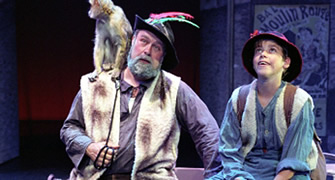
Hector Malot (20
mei 1830- 17 juli 1907)
Scene uit de musical Alleen op de wereld met Bert
Simhoffer (Vitalis) en Scarlet Tummers (Remi)
Koninklijke
Schouwburg Den Haag, 2003
De Noorse schrijfster Sigrid Undset werd geboren in
Kalundborg, Denemarken, op 20 mei 1882. Zie ook alle tags voor Sigrid
Undset op dit blog.
Uit: Jenny
"And the worst thing would be to share
life with another person but deep inside feel just as lonely as before. Oh, no,
no. To belong to a man, with all the subsequent types of intimacy, both
physical and spiritual... and then one day to see that she had never known him,
and he had never known her, and neither of them had ever understood a word the
other person said...(...) So she had to try painting again. Presumably it would
be an utter disaster, since she was walking around sick with love. She laughed.
That's what was wrong with her. The object of her affection hadn't yet
appeared, but the love was there."
(
)
"Where do you live?" asked the taller
girl.
"At a place called the Albergo Torino,
close to the station," he explained.
"He should take the Trastevere tram at San
Carlo ai Catenari," said the other.
"No; better take a No. 1 at the new
Corso."
"But those cars don't go to the
Termini," answered the little one.
"Yes, they do. Those that have San Pietro,
stazione Termini, written on
them," she explained to Helge.
"Oh, that one! It runs past Capo le Case
and Ludovisi and an awful long way about first - it will take an hour at least
to the station with that one."
"No, dear; it goes direct - straight along
Via Nazionale."
"It does not," insisted the other;
"it goes to the Lateran first."
The taller girl turned to Helge: "The
first turning right will take you into a sort of market. From there you go
along the Cancellaria on your left to the new Corso. If I remember rightly, the
tram stops at the Cancellaria.
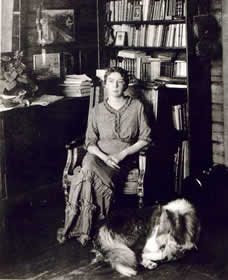
Sigrid Undset (20 mei 1882 10 juni 1949)
De
Franse schrijver Honoré de Balzac werd geboren in Tours op 20 mei 1799. Zie
ook alle tags voor
Honoré de Balzac op dit blog.
Uit: The Wrong
Side of Paris (Vertaald door Jordan Stump)
One fine September evening in the year 1836, a
man of about thirty stood hunched over the parapet of a quay by the Seine.
Facing upstream, he could survey the riverbanks from the Jardin des Plantes to
Notre-Dame; downstream, his gaze followed the waters majestic course all the
way to the Louvre. There is not another such prospect in all the Capital of
Ideas. Standing here on the Île de la Cité, one imagines oneself in the stern
of some sea vessel grown to colossal proportions. The view summons up dreams of
Paris, the Paris of the Romans and the Franks, of the Normans and the
Burgundians; the Paris of the Middle Ages, the Valois, Henri IV and Louis XIV,
Napoleon and Louis-Philippe. Each of these regimes has left some mark or
monument hereabouts, insistently recalling its creators to the observers mind.
Sainte Geneviève watches over the Latin Quarter, spread out beneath her dome.
Behind you rises the magnificent apse of the cathedral. The Hôtel de Ville
speaks to you of Pariss many upheavals, the Hôtel-Dieu of her many miseries.
From here you can glimpse the splendors of the Louvre; now take two steps and
you will have before you that wretched huddle of houses between the Quai de la
Tournelle and the Hôtel-Dieu, toward whose disappearance the city fathers are
working even now.
Another edifying sight graced that wondrous tableau in those days: between the
cathedral and the Parisian at his parapet, the Terrain, for such was the name
of that deserted plot of land in times past, was still strewn with the ruins of
the archbishops palace. Standing where the Parisian now stood, contemplating
this inspiring prospect, with Pariss past and present laid out together before
your admiring gaze, you might think that Religion had chosen to settle on this
island in order to reach out toward the sorrows of both banks of the Seine,
from the Faubourg Saint-Antoine to the Faubourg Saint-Marceau. We can only hope
that a setting so sublimely harmonious will one day be made complete by the
construction of an episcopal palace in pure Gothic style, replacing the drab
hovels now enclosed by the Terrain, the Rue dArcole, the cathedral, and the
Quai de la Cité.
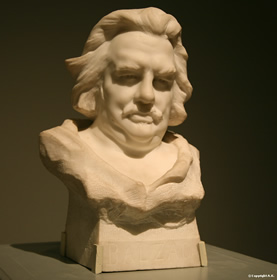
Honoré de Balzac
(20 mei 1799 - 18 augustus 1850)
Borstbeeld door Jean-Joseph-Alexandre
Falguière, 1899
|



